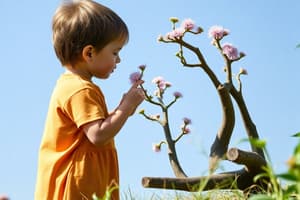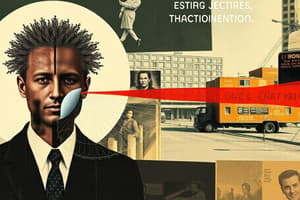Podcast
Questions and Answers
What term does Bronfenbrenner use to describe the influence of the child on the parents and vice versa?
What term does Bronfenbrenner use to describe the influence of the child on the parents and vice versa?
- One-way influences
- Unidirectional influences
- Bi-directional influences (correct)
- Static influences
Which of the following is NOT part of Bronfenbrenner's ecological systems theory?
Which of the following is NOT part of Bronfenbrenner's ecological systems theory?
- Microsystem
- Megasystem (correct)
- Macrosystem
- Mesosystem
Which layer of Bronfenbrenner's ecological systems theory involves direct interactions of the child's immediate environment?
Which layer of Bronfenbrenner's ecological systems theory involves direct interactions of the child's immediate environment?
- Microsystem (correct)
- Exosystem
- Macrosystem
- Mesosystem
In Bronfenbrenner's model, which system would include factors like city government and mass media?
In Bronfenbrenner's model, which system would include factors like city government and mass media?
What best describes the mesosystem in Bronfenbrenner's theory?
What best describes the mesosystem in Bronfenbrenner's theory?
Which statement best describes the macrosystem in Bronfenbrenner's framework?
Which statement best describes the macrosystem in Bronfenbrenner's framework?
How do the elements of the exosystem impact the child's development?
How do the elements of the exosystem impact the child's development?
Which of the following statements about the microsystem is true?
Which of the following statements about the microsystem is true?
What is a primary focus of Bronfenbrenner's Ecological Theory?
What is a primary focus of Bronfenbrenner's Ecological Theory?
Which term refers to the layer of environment that is closest to the child in Bronfenbrenner's model?
Which term refers to the layer of environment that is closest to the child in Bronfenbrenner's model?
What does the term 'bioecological' in Bronfenbrenner's theory indicate?
What does the term 'bioecological' in Bronfenbrenner's theory indicate?
How does change within any particular layer of Bronfenbrenner's model affect child development?
How does change within any particular layer of Bronfenbrenner's model affect child development?
What is included in the microsystem layer according to Bronfenbrenner's theory?
What is included in the microsystem layer according to Bronfenbrenner's theory?
Which of the following best describes Bronfenbrenner's view on child development?
Which of the following best describes Bronfenbrenner's view on child development?
What is the primary focus of Bronfenbrenner's bioecological theory?
What is the primary focus of Bronfenbrenner's bioecological theory?
What significant program did Bronfenbrenner help develop?
What significant program did Bronfenbrenner help develop?
In the context of Bronfenbrenner's model, how do relationships in the microsystem operate?
In the context of Bronfenbrenner's model, how do relationships in the microsystem operate?
What did Bronfenbrenner conclude about the impact of family life on child development?
What did Bronfenbrenner conclude about the impact of family life on child development?
Which program did Bronfenbrenner co-found to aid early childhood education?
Which program did Bronfenbrenner co-found to aid early childhood education?
What is a significant consequence of a breakdown in relationships within a child's microsystem?
What is a significant consequence of a breakdown in relationships within a child's microsystem?
How can schools and teachers contribute to a child's development according to Bronfenbrenner's theory?
How can schools and teachers contribute to a child's development according to Bronfenbrenner's theory?
What aspect of children's development is directly impacted by their interaction with important adults?
What aspect of children's development is directly impacted by their interaction with important adults?
Which statement reflects a misunderstanding regarding Bronfenbrenner's view of school roles?
Which statement reflects a misunderstanding regarding Bronfenbrenner's view of school roles?
What role does mutual interaction with adults play in a child's life according to Bronfenbrenner?
What role does mutual interaction with adults play in a child's life according to Bronfenbrenner?
What is a common expectation for young people in western countries regarding independence?
What is a common expectation for young people in western countries regarding independence?
How do cultural beliefs in some Asian countries differ regarding gender roles in child-rearing?
How do cultural beliefs in some Asian countries differ regarding gender roles in child-rearing?
What aspect of a child's life does the chronosystem focus on?
What aspect of a child's life does the chronosystem focus on?
What influences a child's coping abilities in relation to their environment?
What influences a child's coping abilities in relation to their environment?
What is increasingly recognized as influencing child development?
What is increasingly recognized as influencing child development?
What does Bronfenbrenner's ecological system theory emphasize?
What does Bronfenbrenner's ecological system theory emphasize?
Which factor is NOT considered an element of the chronosystem?
Which factor is NOT considered an element of the chronosystem?
What potential challenge might girls face due to cultural beliefs in certain societies?
What potential challenge might girls face due to cultural beliefs in certain societies?
Flashcards
Macrosystem
Macrosystem
The broadest level of the ecological systems theory, encompassing cultural values, customs, and laws that shape child-rearing practices and development.
Chronosystem
Chronosystem
The element of time in Bronfenbrenner's ecological systems theory; patterns of stability and change in a child's life, including routines, transitions, and biological changes.
Nature vs. Nurture
Nature vs. Nurture
The debate about the relative importance of genetics (nature) and environment (nurture) in child development.
Ecological Systems Theory
Ecological Systems Theory
Signup and view all the flashcards
Child Development
Child Development
Signup and view all the flashcards
Child-rearing Practices
Child-rearing Practices
Signup and view all the flashcards
Environmental Influences
Environmental Influences
Signup and view all the flashcards
Development Theories
Development Theories
Signup and view all the flashcards
Exosystem
Exosystem
Signup and view all the flashcards
Bi-directional influence
Bi-directional influence
Signup and view all the flashcards
Example of Exosystem influence
Example of Exosystem influence
Signup and view all the flashcards
Example of Mesosystem influence
Example of Mesosystem influence
Signup and view all the flashcards
Bronfenbrenner's Ecological Systems Theory
Bronfenbrenner's Ecological Systems Theory
Signup and view all the flashcards
Bioecological
Bioecological
Signup and view all the flashcards
Urie Bronfenbrenner
Urie Bronfenbrenner
Signup and view all the flashcards
Bronfenbrenner's Bioecological Theory
Bronfenbrenner's Bioecological Theory
Signup and view all the flashcards
Head Start
Head Start
Signup and view all the flashcards
Family instability
Family instability
Signup and view all the flashcards
Teacher's role (according to Bronfenbrenner)
Teacher's role (according to Bronfenbrenner)
Signup and view all the flashcards
Impact of relationships
Impact of relationships
Signup and view all the flashcards
Environmental systems
Environmental systems
Signup and view all the flashcards
Study Notes
Bronfenbrenner's Ecological Theory
- Urie Bronfenbrenner developed a useful paradigm to understand the factors influencing individual development.
- His theory highlights the ever-widening spheres of influence impacting individuals. These factors range from the immediate family to the wider community, country, and even global contexts.
- The theory is also known as the bioecological systems theory.
Introduction
- Bronfenbrenner's theory demonstrates how different factors impact individual development.
- It portrays these influences spreading outwards from the family, affecting the neighborhood, nation, and ultimately, the world.
Bronfenbrenner's Model
- The interconnectedness of different environments shapes development.
- A child's biological makeup is crucial for development, and both biology and environment are important.
Urie Bronfenbrenner
- A Russian-born American psychologist.
- He is renowned for his ecological systems theory.
- He collaborated with the US government in creating the Head Start program in 1965.
- Born in 1917 and died in 2005.
Bronfenbrenner's Model/Bioecological Systems
- The theory analyzes child development within a system of interconnected environments.
- These layers affect the child, and they are further divided into specific structures.
- A child's biology is a significant factor in their development.
The Microsystem
- The microsystem is the environment closest to the child.
- It includes family, school, and neighborhood.
- The microsystem involves interactions between the child and other people.
- These interactions are two-way, with the child influencing others, and vice-versa.
- Teachers and parents are significantly influential members of the microsystem.
The Mesosystem
- This layer links structures in the microsystem, connecting different environments.
- This includes, for example, interactions between parents and teachers, or parents and health services.
- Interactions like these can affect the child's development.
The Exosystem
- The exosystem refers to settings where children are not directly involved, but which affect them.
- These include workplace schedules or government policies.
- The exosystem can influence the child indirectly via the microsystem.
- The exosystem shapes the child's microsystem setting.
The Macrosystem
- The macrosystem encompasses the cultural values, beliefs, and laws of society.
- This layer influences the child's interactions within the other layers.
- Cultural norms and expectations have a vital part in impacting the overall child development.
The Chronosystem
- The chronosystem reflects the environmental changes occurring over time.
- This includes societal shifts and personal events.
- Events like sibling births or family relocations impact the child's journey.
- Time's influence on surroundings significantly plays a role in a child's well-being.
Nature vs. Nurture
- The debate of nature vs. nurture is becoming less relevant.
- Both a child's biology and environment are crucial to development.
- Interactions between these aspects are critical.
The Ecological System Theory
- This theory focuses on the context, impact, and quality of the child's environment.
- A child continually develops amidst shifting interaction patterns between these layers.
- It helps understand how various circumstances and interactions affect the child's growth and development.
Roles of Schools and Teachers
- Bronfenbrenner highlights the crucial role schools and teachers play in supporting children's development.
- Teacher's role extends beyond instruction. They play a vital role to compensate if family structures are lacking support and care.
- The theory aids teachers in recognizing and addressing children's needs and characteristics based on the environment they come from.
- Schools should be environments that welcome and help families.
Head Start
- Head Start is a US government program founded to provide early childhood education and support to low-income families.
- This program aims to support children's development.
Bronfenbrenner's Conclusion
- Family instability can significantly hinder children's development.
- Constant interaction with adults is vital for appropriate development.
- Inadequacies in crucial family relationships can create issues with self-direction in a child's life.
Studying That Suits You
Use AI to generate personalized quizzes and flashcards to suit your learning preferences.
Related Documents
Description
Test your understanding of Urie Bronfenbrenner's Ecological Theory, which outlines how various factors influence individual development. This quiz covers key concepts from his bioecological systems theory, including the spheres of influence from family to global contexts.




